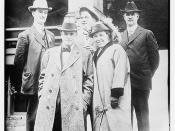Title: When Good Men Do Nothing
Stanley Benn discussed several types of wickedness in his essay Wickedness. Malignant wickedness strives for evil simply because it is evil; self-centered wickedness promotes a person's self interest at the expense of others; conscientious wickedness pursues certain values ruthlessly without proper consideration of other merited values. Benn's opinion differs from Socrates on the topic of malignant evil. Benn regards malignant evil as an innate trait that could not be reformed, while all other types of evil could be cured through proper education and more rationality. Each type of evil mentioned earlier has its representative in the story of Billy Budd. Claggert bears malice for Billy for the sake of evil and his natural tendency to detest the good; Squeak ignores the importance of goodness, justice, and honesty in his blind pursuit of self-interest; Captin Vere falls victim to his stubborn upholding of the martial laws while fairness and conscience are sacrificed at their expense.
The flood of pure evil seeks to overflow the good. Good is defenseless because good is unaware of the danger from the purest form of evil. Men in between the extreme ends of the good-evil scale have to protect the good in order to preserve it. Both Squeak and Captain Vere could have prevented the tragedy of Billy Budd, but they failed to. They were overridden with their own forms of evil, so they did nothing. Evil too often triumphs over good because too many individuals do nothing to help the good.
Claggert is indeed a malignant evil person because he does evil for evil's sake. His actions are apparently cruel and irrational as well. The malignant nature, which resides within Claggert makes him thrive on the suffering of others. He punishes the sailors excessively and does not...


